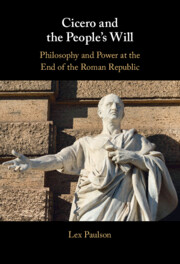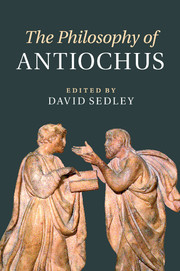Cicero and the People’s Will
Philosophy and Power at the End of the Roman Republic
$99.99 (F)
- Author: Lex Paulson, Université Mohammed VI Polytechnique, Morocco
- Date Published: December 2022
- availability: Available
- format: Hardback
- isbn: 9781316514115
$
99.99
(F)
Hardback
Other available formats:
eBook
Looking for an examination copy?
This title is not currently available for examination. However, if you are interested in the title for your course we can consider offering an examination copy. To register your interest please contact [email protected] providing details of the course you are teaching.
-
This book tells an overlooked story in the history of ideas, a drama of cut-throat politics and philosophy of mind. For it is Cicero, statesman and philosopher, who gives shape to the notion of will in Western thought, from criminal will to moral willpower and 'the will of the people'. In a single word – voluntas – he brings Roman law in contact with Greek ideas, chief among them Plato's claim that a rational elite must rule. When the republic falls to Caesarism, Cicero turns his political argument inward: Will is a force in the soul to win the virtue lost on the battlefield, the mark of inner freedom in an unfree age. Though this constitutional vision failed in his own time, Cicero's ideals of popular sovereignty and rational elitism have shaped and fractured the modern world – and Ciceronian creativity may yet save it.
Read more- Interdisciplinary: Through a holistic study of Cicero's corpus, brings together subjects of politics, law and philosophy of mind that are typically considered apart
- Accessible: Places technical debates in ancient philosophy in accessible prose, grounded in the drama of the fall of the Roman republic
- Urgent: Traces the intellectual origins of modern constitutionalism and today's democratic crisis, rooted in a reciprocal distrust of citizens and government
Reviews & endorsements
‘Paulson’s book has laid the groundwork for a re-evaluation of the philosophical and political ideas that we have inherited from the Roman world.’ David Sedley, Laurence Professor of Ancient Philosophy, University of Cambridge
See more reviews‘The story of Cicero has much to teach us about our own fragile republics – where their flaws began, and how we can still fix them.’ U.S. Congressman Jim Himes, Connecticut
‘If there is a single abstract noun that has done more to shape the modern world than any other, it may well be the Latin voluntas, which we ordinarily translate as ‘will’. In bold and commanding prose, Lex Paulson recounts this history for us, showing us the fascinating transformations of the concept of will in the work of Cicero. Paulson’s isolation of this key moment, and his expert account of its enduring relevance for our own polities, is nothing short of a revelation.’ Justin E. H. Smith, Professor of History and Philosophy of Science, University of Paris
‘Before reading Paulson's book, I knew Cicero as the Illinois burg with one of the world's first airfields, where Al Capone's gang ran rampant. As it turns out, the real Cicero was just as tough and every bit as ingenious.’ Sir Michael Lindsay-Hogg
'Paulson’s book provides an incredibly detailed look at Cicero’s use of the term voluntas and will be of particular relevance to those in the field of moral philosophy … Recommended.' J. Boersma, Choice
‘Highly stimulating … an ambitious study that tackles an enormous body of evidence and offers an engaging and wide-ranging account.’ Bryn Mawr, Classical Review
‘… an ambitious study that tackles an enormous body of evidence and offers an engaging and wide-ranging account of the multiple dimensions of the Latin term voluntas in Cicero’s literary corpus. It will be of value to all those interested in the social, political, and intellectual history of the late Roman republic.’ Sean McConnell, Bryn Mawr Classical Review
Customer reviews
Not yet reviewed
Be the first to review
Review was not posted due to profanity
×Product details
- Date Published: December 2022
- format: Hardback
- isbn: 9781316514115
- length: 300 pages
- dimensions: 235 x 155 x 20 mm
- weight: 0.56kg
- availability: Available
Table of Contents
Part I. The Practice of Voluntas:
1. Forebears of will
2. Innocence and intent
3. Cartographies of power
4. An economy of goodwill
5. Voluntas populi: the will of the people
Part II. The philosophy of voluntas:
6. Willpower
7. Free will and the forum
8. The fourfold self.
Sorry, this resource is locked
Please register or sign in to request access. If you are having problems accessing these resources please email [email protected]
Register Sign in» Proceed
You are now leaving the Cambridge University Press website. Your eBook purchase and download will be completed by our partner www.ebooks.com. Please see the permission section of the www.ebooks.com catalogue page for details of the print & copy limits on our eBooks.
Continue ×Are you sure you want to delete your account?
This cannot be undone.
Thank you for your feedback which will help us improve our service.
If you requested a response, we will make sure to get back to you shortly.
×



